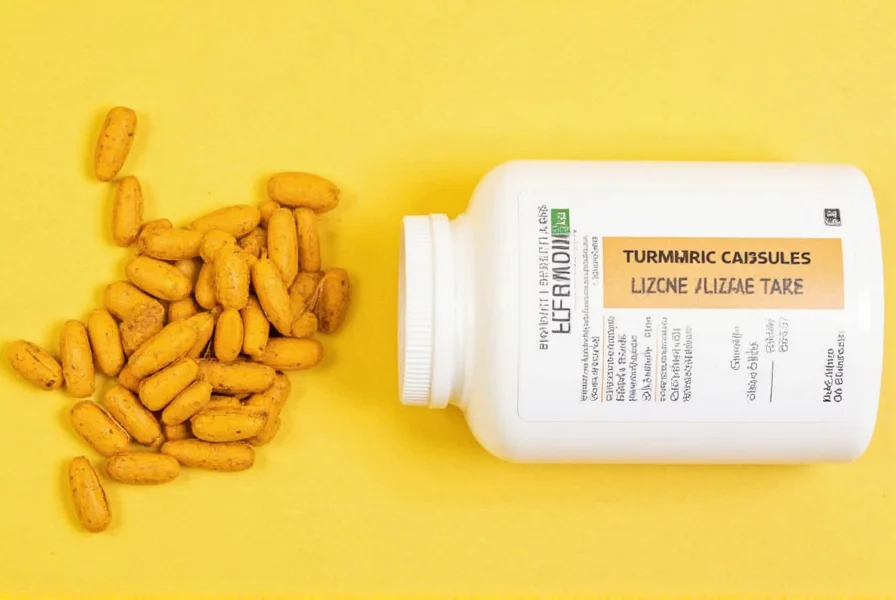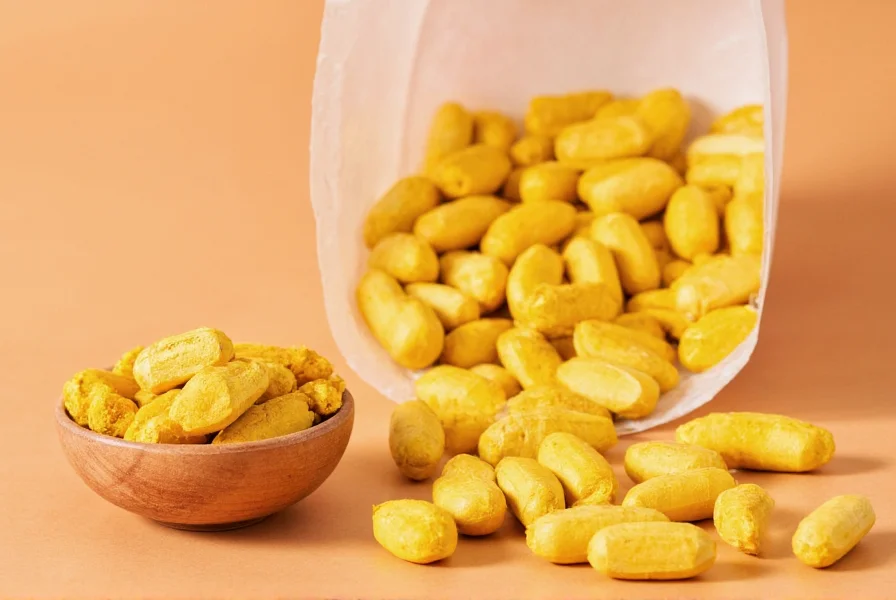For centuries, turmeric has been valued in traditional medicine systems across Asia. Modern science has focused on isolating and understanding curcumin, the primary bioactive compound responsible for turmeric's distinctive yellow color and potential health properties. Turmeric capsules offer a convenient way to consume standardized amounts of curcumin, addressing the inconsistent curcumin levels found in culinary turmeric powder.
The Science Behind Curcumin
Curcumin constitutes only about 2-8% of raw turmeric root by weight. This low concentration explains why consuming turmeric in food provides minimal curcumin compared to standardized supplements. Research published in Advances in Experimental Medicine and Biology indicates curcumin demonstrates anti-inflammatory, antioxidant, and potential neuroprotective properties at the cellular level.
However, curcumin faces significant bioavailability challenges. A study in Food Science & Nutrition found that pure curcumin has poor absorption, rapid metabolism, and quick systemic elimination. This explains why many quality turmeric capsules include:
| Enhancement Method | Mechanism | Effectiveness Increase |
|---|---|---|
| Piperine (black pepper extract) | Slows liver metabolism | Up to 2,000% |
| Liposomal delivery | Encapsulates curcumin in fat spheres | Up to 65x absorption |
| Phospholipid complexes | Binds to fat molecules | Up to 29x absorption |
Evidence-Based Benefits and Limitations
A comprehensive review in The Journal of Medicinal Food analyzed 120 studies on curcumin's effects. The research suggests potential benefits for:
- Joint health: Multiple randomized controlled trials show modest improvement in osteoarthritis symptoms compared to placebo
- Inflammation markers: Significant reduction in CRP (C-reactive protein) levels in several studies
- Mood support: Emerging research indicates possible benefits for depressive symptoms
However, the same review noted significant limitations:
- Most studies used small sample sizes (under 100 participants)
- Long-term effects beyond 6-12 months remain understudied
- Results vary significantly based on formulation and dosage

Practical Usage Guidelines
Based on current research, here's what consumers should know about using turmeric capsules effectively:
Dosage Considerations
Most clinical trials showing benefits used 500-2,000mg of standardized curcumin extract daily, typically divided into two doses. The Arthritis Foundation suggests 400-600mg of curcumin supplements three times daily, but emphasizes consulting with healthcare providers first.
Timing and Absorption
Curcumin is fat-soluble, meaning it absorbs better when taken with food containing healthy fats. Research in Molecular Pharmaceutics demonstrated that taking curcumin with a high-fat meal increased absorption by 30-60% compared to taking it on an empty stomach.
Potential Interactions and Side Effects
Turmeric supplements may interact with certain medications:
- Blood thinners: Curcumin may enhance effects of medications like warfarin
- Diabetes medications: May increase hypoglycemia risk
- Iron absorption: High doses may interfere with iron metabolism
Common side effects at higher doses (over 1,500mg daily) include digestive discomfort and acid reflux. The European Food Safety Authority established an acceptable daily intake of 0.13mg per pound of body weight (0.3mg/kg).
Choosing Quality Turmeric Supplements
Not all turmeric capsules deliver what they promise. A 2021 study published in Frontiers in Pharmacology found significant variation in curcumin content among commercial products. When selecting turmeric capsules, look for:
- Standardized curcumin content (typically 95% curcuminoids)
- Third-party testing verification (USP, NSF, or ConsumerLab)
- Bioavailability enhancement method clearly stated
- Transparent ingredient listing without unnecessary fillers
Be wary of products making definitive medical claims like "cures arthritis" or "treats cancer." Legitimate supplement manufacturers understand that turmeric capsules are dietary supplements, not FDA-approved treatments for diseases.
Realistic Expectations for Turmeric Capsules
While turmeric supplements show promise in research, they're not miracle cures. The most realistic benefits for most users include:
- Supporting the body's natural inflammatory response
- Providing antioxidant protection at the cellular level
- Potentially complementing other healthy lifestyle choices
Think of turmeric capsules as one component of a comprehensive approach to wellness, not a standalone solution. They work best when combined with a balanced diet, regular exercise, and other evidence-based health practices.
When Turmeric Capsules Might Be Appropriate
Based on current evidence, turmeric capsules may be worth considering if:
- You're looking for natural support for occasional joint discomfort
- You want to increase your antioxidant intake
- You're working with a healthcare provider on a comprehensive wellness plan
- You understand they're supplements, not replacements for medical treatment
They're generally not recommended as primary treatment for diagnosed medical conditions without professional medical guidance.
Conclusion: A Balanced Perspective
Turmeric capsules offer a convenient way to consume standardized amounts of curcumin, potentially supporting the body's natural inflammatory response and providing antioxidant benefits. While research shows promise, it's crucial to maintain realistic expectations and understand that supplements work best as part of a comprehensive wellness approach.
Quality matters significantly with turmeric supplements—look for products with verified curcumin content and bioavailability enhancement. Always consult with healthcare professionals before starting any new supplement, especially if you have existing health conditions or take medications.
Frequently Asked Questions
How long does it take for turmeric capsules to show effects?
Most research indicates it takes 4-8 weeks of consistent daily use to notice potential benefits from turmeric capsules. Individual results vary based on formulation, dosage, and personal health factors. Studies measuring inflammatory markers typically show changes after 6-12 weeks of regular supplementation.
Can I take turmeric capsules with other supplements?
Turmeric capsules can generally be taken with most supplements, but caution is needed with blood-thinning supplements like fish oil, garlic, or ginkgo biloba. Curcumin may enhance their effects. Always disclose all supplements to your healthcare provider, especially if taking prescription medications for diabetes, blood pressure, or blood clotting disorders.
What's the difference between turmeric and curcumin supplements?
Turmeric supplements contain the whole turmeric root powder, which is only 2-8% curcumin by weight. Curcumin supplements contain standardized extracts with much higher concentrations of the active compound (typically 95% curcuminoids). Most research on health benefits focuses on curcumin, so quality turmeric capsules specify their curcumin content rather than just total turmeric weight.
Should I take turmeric capsules with food?
Yes, taking turmeric capsules with a meal containing healthy fats significantly improves absorption. Curcumin is fat-soluble, so consuming it with foods like avocado, nuts, or olive oil can increase bioavailability by 30-60% compared to taking it on an empty stomach. This is especially important for standard curcumin formulations without bioavailability enhancers.











 浙公网安备
33010002000092号
浙公网安备
33010002000092号 浙B2-20120091-4
浙B2-20120091-4